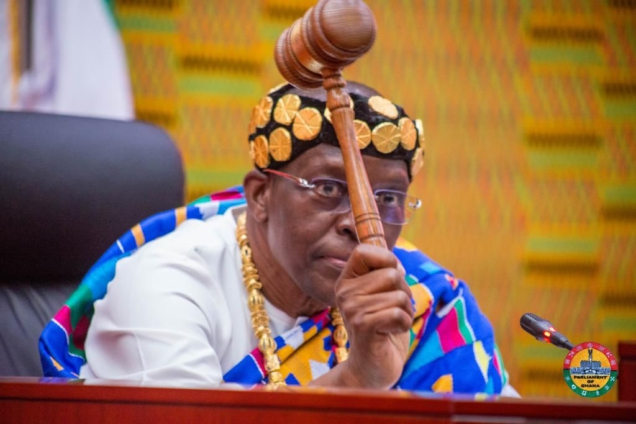Parliament witnessed ‘a procedural standoff’ on Tuesday, June 24, 2025, as Speaker Alban Sumana Kingsford Bagbin schooled the Deputy Minority Whip, Habib Iddrisu, on parliamentary rules following an unsuccessful attempt to block the approval of the seven Supreme Court nominees.
The incident occurred after the House concluded debate on the motion and approved President John Dramani Mahama’s nominees to the Supreme Court. Habib Iddrisu, the Member of Parliament for Tolon, contested the Speaker’s declaration that the nominees had been approved by the voice vote, claiming that there were 120 members present, which fell short of the required quorum of 137 members to make a binding decision.
Also Read: Shake-up: OSP grabs former GRA commissioners over controversial SML contracts
“The House did not have quorum,” insisted the Deputy Minority Whip, emphasizing his count of 120 members as being below the constitutional threshold.
His assertion drew immediate rebuttal from the Majority Leader, Mahama Ayariga, who questioned the accuracy of the figures and cautioned against undermining the legitimacy of parliamentary proceedings.
Deputy Minority Whip
Speaker Bagbin intervened with a calm but firm demeanor to restore order and clarify the constitutional position. He emphasized that the issue of quorum is a matter of law, not merely a count of heads, and that citing a figure like 120 was not conclusive proof of a lack of quorum.
“Don’t be misled by anyone. I want to advise—in many of these situations, don’t react, respond. There’s a vast difference between reacting and responding,” Speaker Bagbin lightly rebuked Hon. Habib Iddrisu, while urging MPs to exercise emotional restraint during debates.
Minority Leader Alexander Afenyo-Markin attempted to raise a constitutional objection based on Article 104, citing the claims of the Tolon MP. However, Speaker Bagbin swiftly dismissed the suggestion, stating that such an application could not be made after the House had already taken a decision.
“You know the rules. After a decision has been taken, you cannot invoke a constitutional objection. If you had concerns, you should have raised them before the vote,” the Speaker pointed out.
Despite the Minority’s strong opposition, Parliament approved President Mahama’s seven nominees to the Supreme Court through a majority decision. The approval followed the presentation of the Appointments Committee’s report by its Chairman, Hon. Bernard Ahiafor, who highlighted the nominees’ profound legal expertise, professionalism, and strong ethical foundations.
The Committee, in its report presented to the House, stated that “All the nominees demonstrated outstanding competence, deep knowledge of the law, and a firm grasp of judicial ethics. They addressed questions posed by the Committee with professionalism, clarity, and intellectual rigour.”
The approved Supreme Court nominees are: Justice Senyo Dzamefe, Justice Sir Dennis Dominic Adjei, Justice Ghell Simon Suurbaarch, Justice Philip Bright Mensah, Justice Janapare Adrua Bartels-Kodwo, Justice Hafisata Amaleboba, and Justice Kweku Tawiah Ackuah-Boafo.
The Minority Caucus, however, voted against the approval of all seven nominees, citing broader constitutional and political concerns. They accused President Mahama of attempting to pack the courts for ulterior motives, particularly in light of the recent suspension of the Chief Justice.
“This is not simply about filling vacancies on the bench. It is about reshaping the constitutional order at a time when the Chief Justice has been suspended and critical questions about judicial overreach and silence on matters of natural justice remain unanswered,” asserted Minority Leader Afenyo-Markin. The Whip also raised concerns about “judicial bloat,” referencing the NDC’s previous opposition to the appointment of two justices they deemed excessive.
In contrast, the Majority Caucus (NDC) unanimously supported the nominees, echoing the Appointments Committee’s assessment of their suitability for the apex court. “We are confident these justices will uphold the independence and integrity of our judiciary. This process has been thorough, constitutional, and in line with the rule of law,” stated Majority Leader Mahama Ayariga.
The newly approved Justices are expected to be sworn into office in the coming days, at a time when the judiciary’s role in upholding constitutional values and democratic governance is under increased scrutiny.


